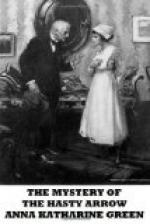Now here was an astonishing discovery! That two women known and recognized as mother and daughter in France should pass for unrelated companions on leaving that country to enter ours. What were we Americans to think of this, especially in the light of the tragic event which so soon terminated this companionship.
That the French records, imperfect as they were, were to be relied upon as stating the truth as to the exact nature of the connection between these two, there could be no doubt. But granting this, what fresh complexities were thus brought into an affair already teeming with incongruities—nay, absolute contradictions.
Madame Duclos’ conduct, as shown toward her young charge, had seemed sufficiently strange and inconsistent when looked upon as that of governess or guardian. But for a mother, and a French mother at that, to allow a young and inexperienced girl to go alone to a strange museum on the very day of their arrival, and then, with or without knowledge of what had happened to her there, to efface herself by flight without promise of return, was inconceivable to anyone acquainted with the most ordinary of French conventions.
Some sinister secret, despite the seeming harmlessness of their lives, must hide behind such unnatural conduct! Was it one connected with or entirely dissociated from the tragedy which had terminated the poor child’s existence? This was the great question. This was what gave new zest to the search for the dark-skinned Frenchwoman, with her drooping eyelid and hesitating walk, and led Sweetwater to whisper into Gryce’s ear, as they stepped out that same day from Headquarters:
“No more nonsense now. We must find that woman or her dead body before the next twenty-four hours have elapsed. With our fingers on that end of the string——”
“We will get hold of some family secret, but not of the immediate one which especially concerns us. Madame Duclos sent her daughter unattended to the museum, but she did not direct the shaft which killed her. That was the work of our friend X. Let us then make sure that we fit the right man to this algebraic symbol, and trust to her testimony to convict him.”
By this time they had reached the taxi which was to convey Mr. Gryce home. But though Sweetwater lent his arm to help the old man in, he did it with such an air of hesitation that it caused the other to remark:
“You have not ended your argument. There is something more you want to say. What is it? Speak up.”
“No, no. I am quite satisfied, so far as the Duclos matter is concerned. It is only—would you mind stepping aside for a moment till I tell you a bit of gossip which has just come to my ears? Thank you, sir. Forbes is all right” (Forbes was the chauffeur), “but confidences are sacred and this thing was told me in confidence.”
The humorous twist of his features as he said this quite transformed his very plain countenance. Mr. Gryce, noting it, began to stare at the first isolated object handy, which in this case happened to be the crooked end of his umbrella—a sign, to those who knew him well, of awakened interest.




